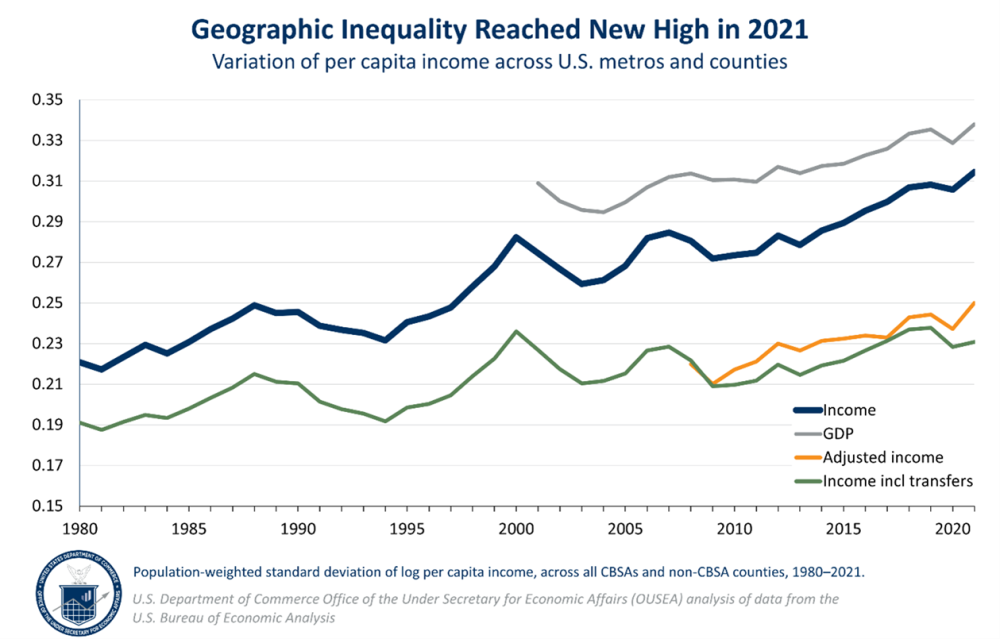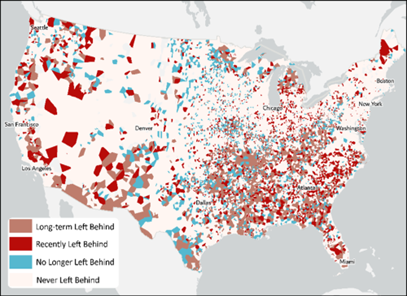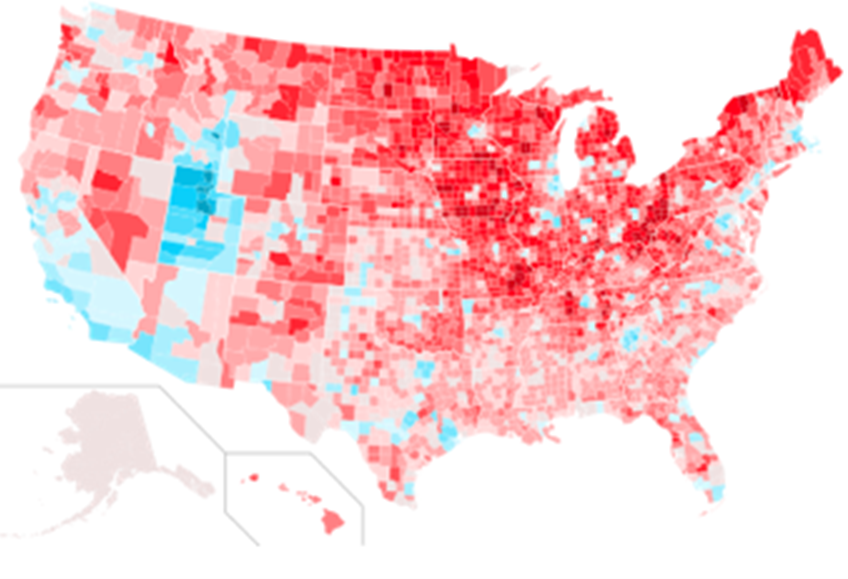 The LSE Phelan US Centre’s Capitalism Essay Competition asked LSE Master’s students to address the question, “How should the United States work to shape the future of capitalism in this age of insecurity?” In the winning essay, David Millman writes that regional inequality has been linked to a rise of populism, nativism, and deglobalization in the US and worldwide. He argues that the US should take a leading role in reshaping global capitalism by focusing on the “places that don’t matter” with tailored place-based initiatives to incentivize economic growth in those areas.
The LSE Phelan US Centre’s Capitalism Essay Competition asked LSE Master’s students to address the question, “How should the United States work to shape the future of capitalism in this age of insecurity?” In the winning essay, David Millman writes that regional inequality has been linked to a rise of populism, nativism, and deglobalization in the US and worldwide. He argues that the US should take a leading role in reshaping global capitalism by focusing on the “places that don’t matter” with tailored place-based initiatives to incentivize economic growth in those areas.
As the current global system of capitalism becomes increasingly unstable, the United States has the ability to restore faith in liberal trade by internationally targeting one of the central driving forces of insecurity: regional inequality. By fostering new economic centers of activity rather than encouraging migration to established ones, the US can reduce the key tensions around international trade, facilitate the integration of untapped potential in “left behind places,” and reshape market capitalism into a more equal and just system not only at home, but also across the world.
Focusing on the local to save the global: Identifying the driving cause of the growing resentment against international trade.
Populism, nativism, and protectionism have spread across the globe as collective anger mounts around the distribution of wealth and opportunities for material advancement. Certain regions in the world have done exponentially well, while others have been left behind with stagnant or even negative economic growth. Over the past forty years, “geographic income inequality in the US has risen more than 40 percent.”
Historically, scholars in economic development have thought, in broad terms, that investing in the most productive urban hubs will lead to the highest degree of economic growth, which will, in turn, benefit the country as a whole. Planners should focus on getting highly skilled labor to move from unproductive areas to productive ones.
Simply put, the market forces of globalization have incentivized the collection of economic activity in the most productive regions (sometimes called “Superstar Cities” such as New York, London, Paris, and San Francisco), diverting resources and capital from other unproductive regions (“left behind places”).
Figure 1 – Changes in per capita income across all US counties, 1980-2021

The distributional effect of this is clear: as Figure 1 shows, some regions benefit tremendously while others are left behind. As scholars such as Andrés Rodríguez-Pose highlight, regional inequality has had massive geopolitical ramifications leading to our age of insecurity around global capitalism. In the United States, regional inequality was central to the 2016 election of President Donald Trump, a populist who is a leading proponent of US protectionism and a retreat from the global stage known as deglobalization. Examples of this can be seen in Europe, Latin America, and Asia. Across the world anti-democratic personalist leaders have risen on the back of regional inequalities.
Take a look at Figure 2, produced by Dylan S Connor and co-authors, in which they measure the “left behind” regions of the United States by measures of “local education levels, poverty and unemployment rates, and average incomes.”
Figure 2 – Map of place-level trajectories across the United States

Now look at Andrés Rodríguez-Pose’s map of territorial vote switch from 2012 to 2016. One can see that there is a clear correlation between left behind regions and support for Donald Trump’s 2016 campaign.
Figure 3 – County vote swing from 2012 to 2016

Deglobalization would have massive consequences for the world economy, slowing growth, weakening democratic and international institutions, as well as reducing economic opportunities for the very people it claims to address. However, it is apparent that the system that produced this territorial inequality needs to be changed. As such, it is necessary for the United States to take a leading role in reshaping global capitalism by focusing on the so-called “places that don’t matter.”
Addressing the root cause of our age of insecurity through “place-sensitive distributed development.”
Our current approach to regional inequalities has failed. US citizens do not want to move as often previous scholars have assumed—and nearly 50 percent of Americans live within 30 miles of their birthplace. The most distressed regions in the US already receive the highest rates of welfare spending, and spatially blind policies have been unable to address the particularly community-based issues of specific regions. Often, welfare policies simply trap regions into dependency without addressing the root causes of a lack of economic opportunity.
The important takeaway here is there is no silver bullet. We must instead, as argued by scholars Simona Iammarino, Andrés Rodríguez-Pose and Michael Storper, pursue “place-sensitive distributed development,” targeting both equity and incentivizing economic growth by tailoring policies to the specific region’s needs. Our goal should be to create a system of different sizes to maximize local talent and provide the largest amount of job opportunities, not concentrating activity in massive cities on the coasts.
The US needs to shift its focus towards policies that allow for individually tailored improvements to the areas that incentivize this type of development. This could include a mixture of facilitating business inputs to a region like improving education and infrastructure, improving human capital through job and language training, or even improving the local government’s ability to take advantage of national investments. In addition to this, some argue that we need to pay particular attention to 21st century inputs such as digital connectivity through broadband.
By focusing on building regional capacity in this way, we can tap into overlooked areas that “enhance both growth at a local and a national level” while simultaneously easing tensions brought on by lack of opportunities and regional inequality. In addition to this, the US can lead abroad, encouraging countries to invest in lagging regions. The US can incentivize foreign direct investment (FDI) through international institutions and domestic actors to areas abroad that have potential but are not yet connected into the global market, thus allowing for more people to truly take advantage of globalization. Researchers have even found that US-led investment overseas can create additional domestic jobs.
In conclusion, the United States has an incredible opportunity to reshape the inequality of globalism into a more equitable system of capitalism. Regional inequality has been linked to a rise of populism, nativism, and deglobalization not only in the US, but across the world. To solve this, policymakers must rethink regional development and inequalities. To save capitalism from this age of economic insecurity, we must turn ‘the places that don’t matter’ into the places that do.
- Photo by Jessica Christian on Unsplash
- Please read our comments policy before commenting.
- Note: This article gives the views of the author, and not the position of USAPP – American Politics and Policy, nor the London School of Economics.
- Shortened URL for this post: https://wp.me/p3I2YF-dCy






